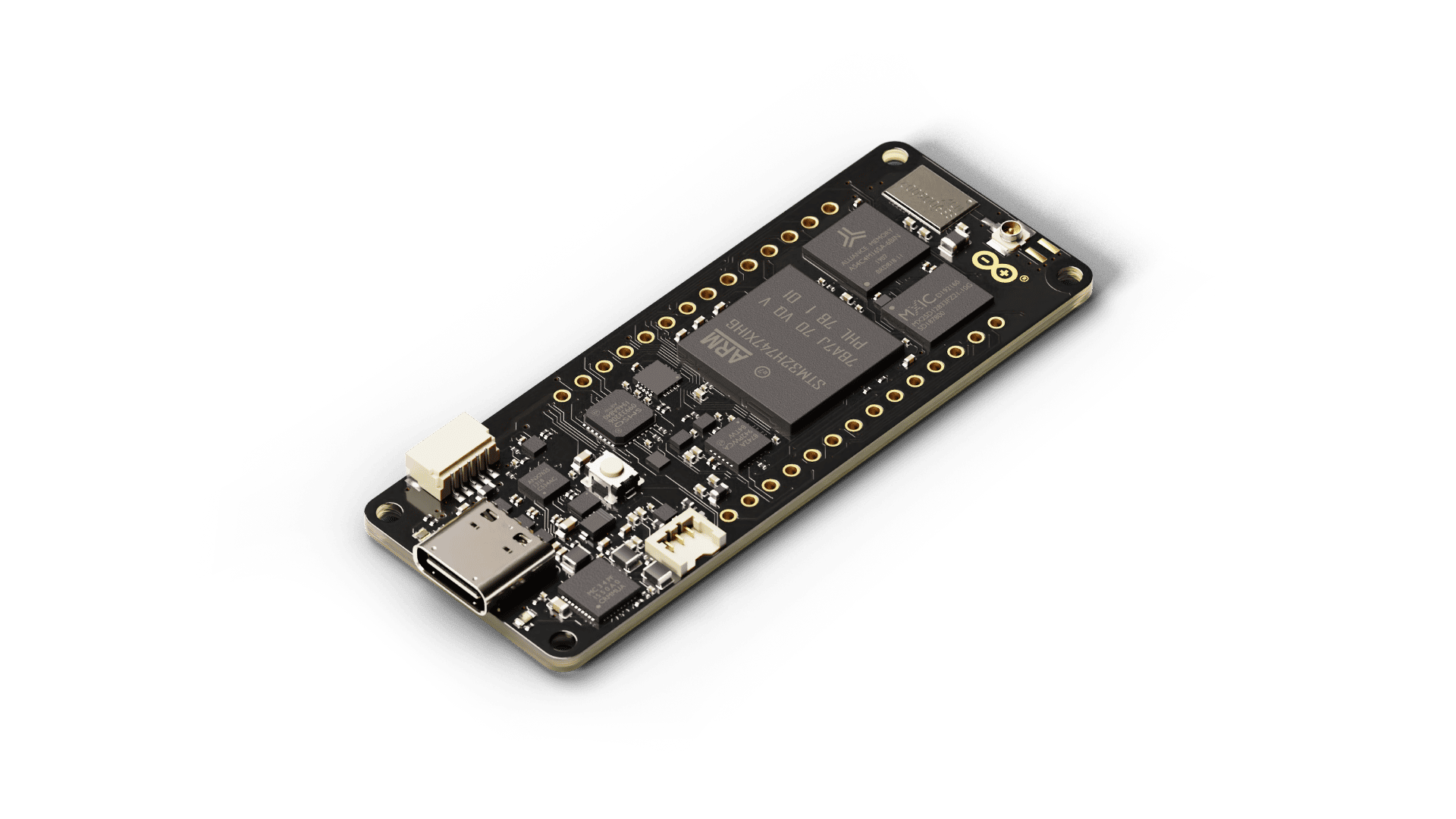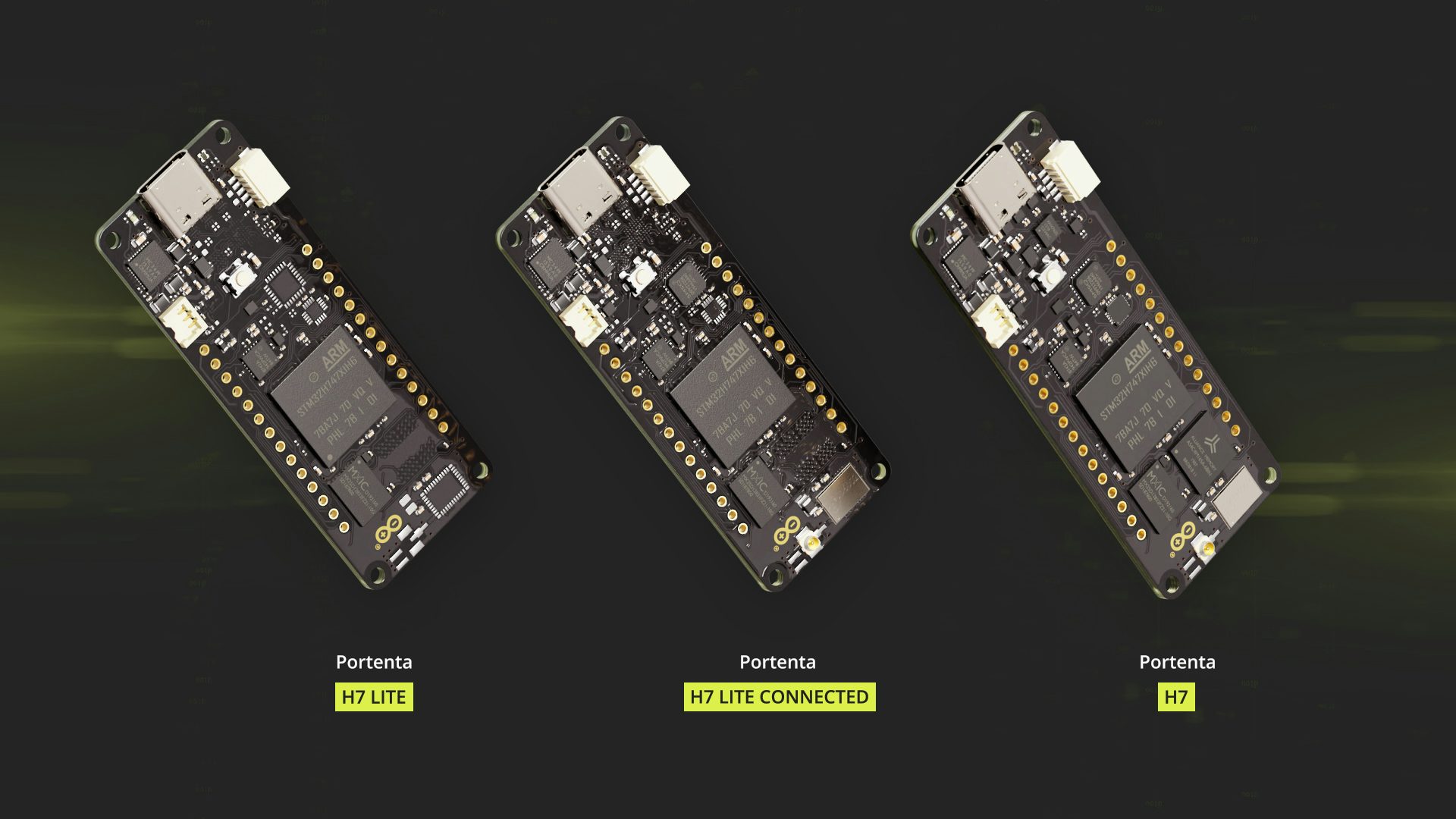
Program it with high-level languages and AI while performing low-latency operations on its customizable hardware
Portenta H7 simultaneously runs high-level code along with real-time tasks
H7's main processor is the STMicroelectronics dual-core STM32H747 including an Arm® Cortex®-M7 running at 480 MHz and an Arm® Cortex®-M4 running at 240 MHz. The two cores communicate via a Remote Procedure Call mechanism that allows calling functions on the other processor seamlessly.
Both processors share all the in-chip peripherals and can run:
- Arduino sketches on top of the Arm® Mbed™ OS
- Native Mbed™ applications
- MicroPython / JavaScript via an interpreter
- TensorFlow™ Lite
The onboard wireless module allows to simultaneously manage Wi-Fi® and Bluetooth® connectivity on the Portenta H7. The Wi-Fi® interface can be operated as an Access Point, as a Station or as a dual mode simultaneous AP/STA and can handle up to 65 Mbps transfer rate. Bluetooth® interface supports Bluetooth® Classic and Bluetooth® LE.
The Portenta H7 complies with the Arduino MKR form factor, but is enhanced with the Portenta family's 80-pin, high-density connector. Learn more about the pinout by reading the documentation.
Find out more about Portenta H7's features, application examples, schematics, connectors and other technical aspects in the board's datasheet.
A new standard for pinouts
The Portenta family adds two 80 pin high density connectors at the bottom of the module. This ensures scalability for a wide range of applications by simply upgrading your Portenta to the one suiting your needs.
Multiple options in one module
Arduino Portenta H7 comes with:
- STM32H747 dual-core processor
- 8 MB SDRAM
- 16 MB NOR Flash
- 10/100 Ethernet Phy
- USB HS
- Secure element
- Wi-Fi®/Bluetooth® Module (except H7 Lite)
- UFL Connector (Antenna)
- DisplayPort over USB-C® (H7 only)
Get Lauterbach TRACE32 debugger for FREE * Read the announcement * Learn how to use the TRACE32 debugger
Two additional variants of the Portenta H7 are now available:
- The Portenta H7 Lite is a cost-optimized solution, ideal for complex environments where radio communication is not suitable or possible. Designed for developers who want to leverage the same computational power of the Portenta H7, but do not need wireless connectivity, high-resolution video interface, and additional security features.
- The Portenta H7 Lite Connected hits another sweet spot for industrial-strength solutions, and fills the gap between the full and Lite variants by integrating wireless connectivity.

Tailor the hardware to your needs
When it comes to high volume orders, we can customize the Portenta H7 configuration. Do you need additional memory? We got you covered: Contact us.
Use Portenta when performance is key
- High-end industrial machinery
- Laboratory equipment
- Computer vision
- PLCs
- Industry-ready user interfaces
- Robotics controller
- Mission-critical devices
- Dedicated stationary computer
- High-speed booting computation (ms)
| MAIN PROCESSOR | STMicroelectronics STM32H747XI dual Arm® Cortex®-M7+M4 32bit low power Arm® MCU |
|---|---|
| SDRAM | 8 MByte |
| QSPI FLASH | 16 MByte |
| ETHERNET | 10/100 Phy |
| WIRELESS (EXCEPT H7 LITE) | Bluetooth® 5.0 + Wi-Fi® 802.11 b/g/n 65Mbps |
| SECURE ELEMENT | ECC608 or SE050C2 (Common Criteria EAL 6+) depending on version |
| DISPLAY CONNECTOR (PORTENTA H7 ONLY) | MIPI DSI host & MIPI D-PHY to interface with low-pin count large displays |
| GPU | Chrom-ART graphical hardware Accelerator™ |
| TIMERS | 22x timers and watchdogs |
| UART | 4x ports (2 with flow control) |
| SD CARD | Interface for SD Card connector (through expansion port only) |
| OPERATIONAL TEMPERATURE | -40 °C to +85 °C (-40 °F to 185 °F) |
| POWER | Through USB-C® connector or LiPo battery (integrated charger) |
| USB-C® | Host / Device, DisplayPort out (Portenta H7 only), High / Full Speed, Power delivery |
| MKR HEADERS | Use any of the existing industrial MKR shields on it |
| HIGH-DENSITY CONNECTORS | Two 80-pin connectors will expose all of the board's peripherals to other devices |
| ESLOV CONNECTOR | Arduino's open connector standard for self-identifiable hardware |
| ADC | 3× ADCs with 16-bit max. resolution (up to 36 channels, up to 3.6 MSPS) |
| DAC | 2× 12-bit DAC (1 MHz) available, only one is accessible by the user through the external A6 pin |